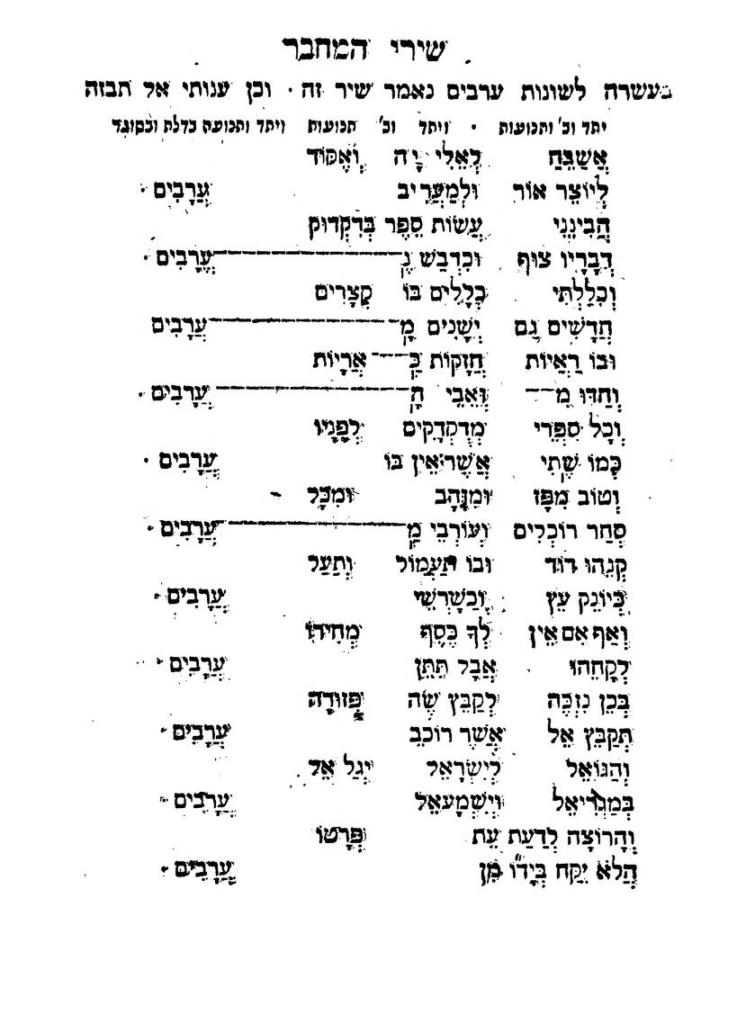בעשרה לשונות ערבים
Poem by Elia Levita (in fine of his grammar: Bachur). in every verse, which each occurrence of ערבים, the word should have a different (dinstinct) meaning. Biblical Puzzle. Levita claims it can be solved by finding a corresponding bible text. Except for the 11th, which is playing with the numerical value of hebrew words (gematria). This is how it looked in the original edition. (titel: shiri ha-mechaber, he author’s poem)

This is how it looks today (copied from wikisource. NB: E l i h w is enhanced in the first line.

The introductory phrase בעשרה לשונות ערבים נאמר שיר זה / וכן עניתי אל תבזה announces the poem (10 meanings), followed by a prayer (transcribed: “ba’ashra leshonot arvim ne’amer shir ze / vekan aniti el tivza” (in ten meanings the word ‘aravim’ is pronounced in this poem / and so I say: ‘Do not despise’)
בעשרה לשונות ערבים נאמר שיר זה / וכן עניתי אל תבזה
אֲשַׁבֵּחַ לְאֵלִי יָהּ וְאֶקֹּד / לְיוֹצֵר אוֹר וְלַמַּעְרִיב עֲרָבִים
הֱבִינַנִּי עֲשׂוֹת סֵפֶר בְּדִקְדּוּק / דְּבָרָיו צוּף וְכִדְבַשׁ נֶעֱרָבִים
וְכָלַלְתִּי כְּלָלִים בּוֹ קְצָרִים / חֲדָשִׁים גַּם יְשָׁנִים מׇעֳרָבִים
וּבוֹ רַאְיוֹת חֲזָקוֹת כָּאֲרָיוֹת / וְחַדּוּ מִזְּאֵבֵי הָעֲרָבִים
וְכָל סִפְרֵי מְדַקְדְּקִים לְפָנָיו / כְּמוֹ שֵׁתִים אֲשֶׁר אֵין בָּם עֲרָבִים
וְטוֹב מִפָּז וּמִזָּהָב וּמִכָּל / סְחַר רוֹכְלִים וְעוֹרְבֵי מַעֲרָבִים
קְנֵהוּ דּוֹד וּבוֹ תַעְמֹל וְתַעַל / כְּיוֹנֵק עֵץ וְכַשׇּׁרְשֵׁי עֲרָבִים
וְאַף אִם אֵין לְךָ כֶּסֶף מְחִירוֹ / לְקָחֵהוּ אֲבָל תִּתֵּן עֲרָבִים
בְּכֵן נִזְכֶּה לְקַבֵּץ שֶׂה פְּזוּרָה / תְּקַבֵּץ אֵל אֲשֶׁר רוֹכֵב עֲרָבִים
וְהַגּוֹאֵל לְיִשְׂרָאֵל יְגַל אֵל / בְּמַגְדִיאֵל וְיִשְׁמָעֵאל עֲרָבִים
וְהָרוֹצֶה לָדַעַת עֵת פְּרָטוֹ / אֲגֻדָּתוֹ יְחַסֵּר מִן עֲרָבִים
Below I gave it a try (with a little help from chatgpt in looking for correspondences. Not entirely convincing, but helpful.)
Semantic Fields of ע-ר-ב
The root ע-ר-ב encompasses several interrelated meanings:
- Mixing / Interweaving / Blending:
- עֵרֶב (ʿerev): Evening, symbolizing the blending of day and night.
- עֵרֶב רַב (ʿerev rav): Mixed multitude, referring to a diverse group, as in Exodus 12:38.
- עֵרֶב (ʿerev): Woof, the crosswise threads in weaving, indicating interlacing.
- Pledging / Guaranteeing / Exchange:
- עָרַב (ʿarav): To pledge or guarantee, as seen in Genesis 43:9.
- עֵרָבוֹן (ʿeravon): A pledge or surety, indicating a form of security or guarantee.
- Evening / Darkness:
- עֶרֶב (ʿerev): Evening, marking the transition from day to night.
- עָרַב (ʿarav): To become evening or to grow dark.
- Pleasantness / Sweetness:
- עָרֵב (ʿarev): Pleasant or sweet, often used to describe agreeable sounds or tastes.
- Geographical and Ethnic Terms:
- עֲרָבָה (ʿaravah): A desert plain or wilderness.
- עֲרָבִי (ʿaravi): An Arab or nomad, relating to the desert regions.
- Animals and Nature:
- עֹרֵב (ʿorev): Raven, a bird often associated with dusk or darkness.
- עֲרָבָה (ʿaravah): Also refers to a type of tree, such as the poplar.
| Hebrew | English Distinct Meaning of “ʿAravim”) | Biblical Reference / explanation |
|---|---|---|
| אֲשַׁבֵּחַ לְאֵלִי יָהּ וָאֶקֹּד. לְיוֹצֵר אוֹר וּלְמַעֲרִיב עֲרָבִים | I will praise my God and bow; to the Fashioner of light and the One who brings on evenings | Genesis 1:5 – “And there was evening and there was morning…” The name of the prayer (‘the bringer of the Evening) , מַעֲרִיב עֲרָבִים / ma’ariv aravim, |
| הֲבִינֵנִי עֲשׂוֹת סֵפֶר בִּדְקֻדּוּק. דְּבָרָיו צוּף וּכְדְבַשׁ נֶעֱרָבִים | Grant me insight to compose a book on grammar; its words flow like nectar and are sweet | Psalms 104:34 – “May my meditation be sweet unto Him” (יִעֱרַב) |
| וְכִלַּלְתִּי כְּלָלִים בּוֹ קְצָרִים. חֲדָשִׁים גַּם יְשָׁנִים מְעֹרָבִים | I included rules, concise and clear; both new and old are intermingled | Exodus 12:38 – “And a mixed multitude went up with them” (עֵרֶב רַב) |
| וּבוֹ רְאִיּוֹת חֲזָקוֹת כַּאֲרָיוֹת. וְחָרוּ מִזִּאֲבֵי הָעֲרָבִים | And in it are proofs strong as lions, and they burned hotter than ‘evening wolves‘ | Habakkuk 1:8: “Their horses are swifter than leopards, more fierce than ‘evening wolves” (זְאֵבֵי עֶרֶב). |
| וְכָל סִפְרֵי הַמְדַקְדְּקִים לְפָנָיו. כְּמוֹ שְׁתַּיִם אֲשֶׁר אֵין בָּהֶן עֲרָבִים | And all grammarians’ books before it are like two without guarantors | Genesis 43:9 – “I will be a guarantor for him (אָנֹכִי אֶעֶרְבֶנּוּ)” |
| וְטוֹב מִפָּז וּמִזָּהָב וּמִכָּל סֵחַר. רוֹכְלִים וְעֹרְבֵי מִעֲרָבִים | Better than fine gold and trade goods, than merchants and the traders of wares ?? (orebi?) | Ezekiel 27:21 – “Arabians and all the chiefs of Kedar were your merchants” v. 14: הִתְעָרְבוּ — they bartered / were involved in trade |
| קָנֵהוּ דָוִד וּבוֹ תַעֲמֹל וְתַעַל. כְּיוֹנֵק עֵץ וּבְשָׁרָשִׁים עֲרָבִים | Acquire it, David, toil and ascend — like a tree sprouting from entwined roots ??? | Ezekiel 17:6 – “And it became a vine… with its branches turned toward him, and its roots were under him” (cf. metaphorical “entwining”) |
| וְאַף אִם אֵין לְךָ כֶּסֶף מְחִירוֹ. לְקָחֵהוּ אֲבָל תִּתֵּן עֲרָבִים | Even if you lack the silver price, take it — but you must provide pledges | Proverbs 20:16 – “Take his garment who is surety for a stranger” לְֽקַח־בִּ֭גְדוֹ כִּי־עָ֣רַב זָ֑ר |
| בְּכֵן נִזְכֶּה לְקַבֵּץ שֵׂה הַפְּזוּרָה. תִּקָּבֵץ אֶל אֲשֶׁר רֹכֵב עֲרָבִים | Thus may we merit to gather the scattered flock, to be brought to Him who rides the clouds | Psalms 68:5 – “Extol Him who rides upon the clouds” (רֹכֵב בָּעֲרָבוֹת) |
| וְהַגּוֹאֵל לְיִשְׂרָאֵל יִגְאָל אֵל. בְּמִגְרִיאֵל וְיִשְׁמָעֵאל עֲרָבִים | And the Redeemer of Israel shall redeem us, in Migriel and Ishmael — Arabs | Isaiah 60:7 – “All the flocks of Kedar shall be gathered unto you…” (context of Arab tribes) ? |
| וְהָרוֹצֶה לָדַעַת עֵת פְּרָטוֹ. הֲלוֹא יִקַּח בְּיָדוֹ מִן עֲרָבִים | Whoever desires to know the date in detail — let him take, by his own hand, from (the numerals of) ‘ʿaravim’ | Gematria: עֲרָבִים = 322 → 5322 AM = 1561 CE (if subtracting 22 from “בידו”, then 5300 AM = 1539 CE) |
